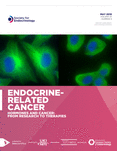Estrogen receptor beta in breast cancer.
Abstract
Estrogen is essential for normal growth and differentiation in the mammary gland. It also supports growth of approximately 50% of primary breast cancers. For this reason, removal of estrogen or blocking of its action with the anti-estrogen, tamoxifen, is the main treatment for estrogen receptor alpha (ERalpha)-positive tumors. In 1996, when oncologists became aware of a second ER, ERbeta, there was some doubt as to whether this receptor would be of importance in breast cancer because the clinical consensus was that responsiveness to tamoxifen is related to the presence of ERalpha in breast cancer. Today we know that ERalpha and ERbeta have distinct cellular distributions, regulate separate sets of genes and can oppose each other's actions on some genes. We also know that ERbeta is widely expressed in both the normal and malignant breast and that there are proliferating cells in the breast which express ERbeta. In this review we summarize what is known about ERbeta in breast cancer and examine the possibility that ERbeta-selective ligands may well represent a useful class of pharmacological tools with a novel target, namely proliferating cells expressing ERbeta.












